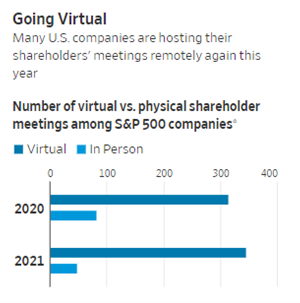
CFO JOURNAL
Companies Say They Are Better Prepared to Host Virtual Annual
Meetings This Year
Berkshire Hathaway, Pfizer are adding more interactive tools,
including live questions and video streams to AGMs
|

Attendees with a cardboard cutout of Berkshire Hathaway Inc.
Chairman and CEO Warren Buffett during the company’s 2019 annual
meeting in Omaha, Neb. Companies such as Berkshire Hathaway are
increasing opportunities for shareholders and investors to
interact with management during virtual annual shareholder
meetings
PHOTO: HOUSTON COFIELD/BLOOMBERG NEWS |
By
Nina
Trentmann
April 26, 2021 8:00 am ET
Some
of the companies that are once again hosting their annual shareholder
meetings virtually this year are hoping to improve the experience for
investors, many of whom felt muted last year after the sudden shift to
remote technology.
Warren Buffett’s Berkshire
Hathaway Inc., pharmaceutical
giant Pfizer Inc. and
Dutch software and services company Wolters
Kluwer NV are among the companies working to increase
interaction with their shareholders, from allowing investors to pose
live questions and interact with management, allocating more time for
questions to incorporating new videoconferencing tools.
The
bulk of annual investor meetings—which take months of
preparation—usually is held between mid-April and June. Last spring,
many businesses abruptly switched
to remote events after lockdown orders and restrictions
were put in place to slow the spread of the coronavirus pandemic. The
last-minute changes to a virtual format resulted in shorter meetings,
fewer direct questions and technical glitches that prevented some
shareholders from voting.
This
year, 346 companies, or 86% of a total of 403 in the S&P 500 that
filed their proxy statement through April 22, said they would hold
their annual shareholder meeting remotely as large physical gatherings
remain restricted, according to data provider MyLogIQ.
|

Wolters Kluwer CFO Kevin Entricken
PHOTO: WOLTERS KLUWER NV |
|
Many of these companies say they are better prepared for virtual meetings. Their
efforts also come as many investor-relations departments look for new ways to
connect with more shareholders to address the recent surge in individual
investing.
“Investors expect public companies to do a better job
this year of providing meaningful ways for their shareholders to
participate in virtual annual meetings,” said Amy Borrus, executive
director at the Council of Institutional Investors, an investor group
representing pension funds and other big money managers, “Unlike last
proxy season, corporate executives have had a year to plan and work
out any kinks.”
Berkshire Hathaway, which used to welcome tens of
thousands of investors a year to Omaha, Neb., for instance, will
allocate 3½ hours for Q&A during its annual event on May 1.
|

Note: Includes companies that filed their proxy statement
through April 22. Hybrid meetings aren't included in the data.
Source: MyLogIQ |
|
That amount of time is unusual, said Miriam Schwartz-Ziv, a senior lecturer at
the Hebrew University in Jerusalem who has researched virtual shareholder
meetings. Still, for Berkshire, the 2½ hours of Q&A at last
year’s event was less than half the time it allocated for previous
in-person events, she said. The company didn’t immediately respond to a request
for comment.
U.S. securities regulators also are watching closely,
even though annual shareholder meetings are largely governed by state
law. “We strongly encourage companies to look at virtual meetings as
an opportunity to enhance but not stifle shareholder participation and
voting,” John Coates, acting director of the corporate finance
division at the Securities and Exchange Commission, said at a
conference last week.
New York-based Pfizer accepted both live questions and
advance submissions during its meeting on Thursday, an improvement
from last year, when questions had to be filed ahead using an online
platform. Pfizer also offered a video stream of the chairman’s and
management team’s speeches, as opposed to the audio-only platform last
year, according to a spokeswoman. “We have designed our meeting to
align with the in-person meeting as much as possible,” she said.
Netherlands-based Wolters Kluwer last week allowed
shareholders to ask questions in real time. In 2020, people had to
submit questions in advance with a moderator reading all of them
during the meeting, Chief Financial Officer Kevin Entricken said.
The shift to a virtual format last year resulted in
overall shorter meetings with less time for questions from investors.
Shareholder meetings at a sample 125 companies in the S&P 500 in 2020
lasted about 32.7 minutes on average, 17% shorter than the physical
event the year before, according to a recent study by the Hebrew
University of Jerusalem.
The time allocated for questions and answers went down
by 16% and companies on average spent 2 minutes answering a question,
compared with 2.6 minutes during the prior year, the study found. “The
quality of the participation at online meetings is very limited,” said
Ms. Schwartz-Ziv, the author of the study. “There is no dialogue in an
online meeting.”
Companies that provide the technology used for the
meetings point to improvements, including better live video streams
and the ability to identify shareholders more easily. “A year later,
we are all experts in virtual meetings,” said Sherry Moreland, chief
operating officer at Mediant Communications Inc., one of the
technology providers. “We now know how to use the technology.”
|

Deborah Thomas is the CFO of Hasbro Inc.
PHOTO: HASBRO |
|
Broadridge Financial Solutions Inc., a
provider of investing, governance and communications tools, recently overhauled
its platform to offer Zoom-like video functionality, better planning instruments
and more options for Q&A. Most of the company’s U.S. clients have been
transferred to the new product, Broadridge said.
Virtual shareholder meetings have several advantages
for companies. They cost less and don’t take up as much time in
executive calendars as in-person events. Hosting the event remotely
also can make it easier for more investors to attend.
Some companies already are exploring new formats to
communicate with individual investors, including hosting events on
Clubhouse, the audio-discussion app. “We called it an ‘ask me
anything’ meeting,” CarParts. Com Inc. CFO and COO David Meniane said.
The auto-parts retailer said about 2,100 investors and others attended
its 40-minute-long session.
Oral-care company SmileDirectClub Inc. plans
to host an event via Clubhouse around its next earnings release, CFO
Kyle Wailes said. “There are a variety of Q&A sessions that we have
seen work well for other companies,” he said.
Many companies still haven’t decided how their investor
events will look like once the pandemic has abated. Some of them plan
to return to an in-person meeting, while others are leaning toward
hosting a hybrid or an online-only event.
Toy maker Hasbro Inc. next
year expects to go back to a physical event, said CFO Deborah Thomas.
“We think it’s good practice,” Ms. Thomas said, referring to having an
in-person shareholder meeting.
—Mark Maurer contributed to this article.
Write
to Nina Trentmann at nina.trentmann@wsj.com



